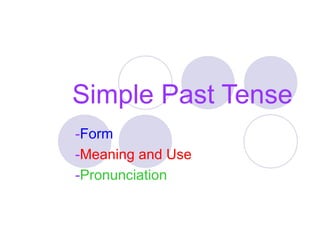Past tense ppt
- 1. Simple Past Tense -Form -Meaning and Use -Pronunciation
- 2. How do we form the simple past tense? English has two types of verbs in the past: -regular -irregular
- 3. Letâs read the following list of past tense verbsâĶ.. Which are regular and which are irregular? ïŽwalked regular ïŽstudied regular ïŽtaught irregular ïŽgave irregular ïŽbecame irregular ïŽcried regular ïŽlived regular ïŽdid irregular
- 4. Regular verbs are verbs that end with -ed Simple form verbs: walk study cry live Past tense verbs: walked studied cried lived
- 5. Rules for adding âed: ïŽAdd âed to most verbs ïŽDrop the âeâ and add âedâ to verbs that end with âeâ (smile= smiled). ïŽChange the âyâ to âiâ and add âed to verbs that end with a consonant and âyâ (carry= carried, study= studied). ïŽDouble the consonant and add âed to verbs that end with one vowel and one consonant ( drag= dragged, stop= stopped).
- 6. Irregular verbs are verbs that donât end in âedâĶâĶ.. Sometimes with irregular past tense verbs you have to change the vowel to make the verb past tense: become became give gave drive drove forget forgot
- 7. Other irregular verbs have a different kind of changeâĶ..you need to memorize these! teach bring leave hear buy taught brought left heard bought
- 8. Why do we use past tense verbs? TO TELL THAT AN ACTION IS COMPLETED!!!!!! FINISHED!!! OVER!!!
- 9. PRONOUNCIATION OF REGULAR VERBSâĶâĶ The âed ending in English has three different sounds: t: walked, talked, jumped d: played, loved, answered id: invited, waited decided.... *With âid sounding words, there is another syllable!
- 10. How can you practice past tense verbs? ïŽPhonemically (word sorts) ïŽBingo! ïŽModeling ïŽSurvey saysâĶâĶ ïŽNancy FetzerâĶâĶâĶ Direct instruction + muiltiple opportunities to practice = Skill mastery!!!!!










